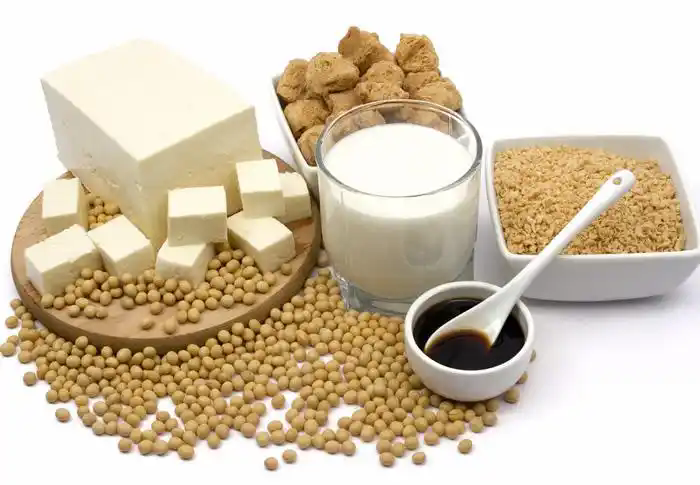
BERITA
Pasar Protein Nabati Terhidrolisis: Meningkatnya Permintaan Solusi Perawatan Kulit Berbasis Tanaman
2024-12-13
Itu pasar protein nabati terhidrolisis berkembang pesat karena konsumen semakin menyadari manfaat bahan perawatan kulit berbasis tanaman. Karena permintaan akan produk kecantikan yang alami, efektif, dan ramah lingkungan terus meningkat, protein nabati terhidrolisis muncul sebagai bahan utama dalam formulasi perawatan kulit. Dari kemampuannya untuk menghidrasi dan memperbaiki hingga sifat-sifatnya yang menutrisi, bahan ini telah ditemukan dalam banyak produk perawatan kulit premium. Dalam artikel ini, kita akan membahas bagaimana pasar protein nabati terhidrolisis berkembang dan mengapa bahan ini mendapat perhatian di kalangan produsen dan konsumen perawatan kulit.
Kebangkitan Protein Sayuran Terhidrolisis dalam Perawatan Kulit
Protein nabati terhidrolisis adalah protein yang berasal dari tumbuhan yang telah dipecah menjadi komponen yang lebih kecil melalui proses hidrolisis. Hal ini memudahkan protein untuk menembus kulit, memberikan hidrasi yang lebih baik, meningkatkan elastisitas kulit, dan meningkatkan kesehatan kulit. Tren global terhadap produk perawatan kulit yang berkelanjutan dan berbasis tumbuhan mendorong semakin banyaknya penggunaan protein nabati terhidrolisis, karena semakin banyak merek yang berupaya menyesuaikan diri dengan preferensi konsumen terhadap bahan-bahan alami dan bebas dari kekejaman.
Protein diekstraksi dari berbagai sumber tanaman, termasuk kedelai, gandum, Dan jagung, masing-masing menyumbangkan asam amino unik yang bermanfaat bagi kulit. Karena konsumen menuntut solusi kecantikan yang lebih efektif dan bersih, protein nabati terhidrolisis dengan cepat menjadi bahan penting dalam krim pelembab, serum anti-penuaan, dan masker wajah restoratif.
Pendorong Utama Pertumbuhan Ekonomi Pasar Protein Nabati Terhidrolisis
Beberapa faktor yang mendorong pertumbuhan pasar protein nabati terhidrolisisBerikut ini, kami uraikan faktor pendorong utamanya:
| Pengemudi Utama | Dampak terhadap Pertumbuhan Pasar |
|---|---|
| Meningkatnya Permintaan Produk Berbasis Tanaman | Konsumen beralih ke bahan-bahan yang berasal dari tumbuhan dalam perawatan kulit karena dianggap aman dan berkelanjutan. |
| Keberlanjutan dan Praktik Etis | Kesadaran ekologi konsumen modern mendorong permintaan akan protein nabati yang dapat terurai secara hayati dan bebas dari kekejaman. |
| Peningkatan Fokus pada Kesehatan Kulit | Efektivitas protein nabati terhidrolisis dalam meningkatkan hidrasi dan elastisitas kulit memicu popularitasnya. |
| Inovasi dalam Formulasi Perawatan Kulit | Produsen sedang mengeksplorasi cara-cara baru untuk mengintegrasikan protein nabati terhidrolisis menjadi beragam produk perawatan kulit. |
Faktor-faktor pendorong ini menunjukkan lintasan pertumbuhan yang kuat dan berkelanjutan bagi pasar protein nabati terhidrolisis, karena semakin banyak konsumen yang memprioritaskan produk yang efektif dan ramah lingkungan.
Protein Sayuran Terhidrolisis:Mengapa Ini Menjadi Pengubah Permainan dalam Perawatan Kulit
Sebagai bahan utama dalam banyak formulasi perawatan kulit, protein nabati terhidrolisis menawarkan berbagai manfaat. Berikut ini alasannya mengapa hal ini semakin populer:
1. Peningkatan Hidrasi
Salah satu fitur menonjol dari protein nabati terhidrolisis adalah kemampuannya untuk meningkatkan hidrasi kulit. Karena struktur molekulnya yang kecil, produk ini dapat meresap ke dalam kulit, memberikan kelembapan yang tahan lama dan mencegah dehidrasi. Produk ini menciptakan lapisan tipis yang mengunci kelembapan, membuat kulit terasa lembut dan ternutrisi.
2. Perlindungan Penghalang Kulit
Itu protein nabati terhidrolisis membantu memperkuat lapisan alami kulit, melindunginya dari agresor lingkungan seperti polusi dan sinar UV. Lapisan kulit yang lebih kuat juga membantu mencegah hilangnya kelembapan, menjaga kulit tampak halus dan awet muda.
3. Meningkatkan Elastisitas Kulit
Seiring bertambahnya usia, elastisitas kulit secara alami menurun, yang menyebabkan terbentuknya garis-garis halus dan kerutan. Protein nabati terhidrolisis dapat membantu memulihkan dan menjaga elastisitas kulit, mengurangi tampilan penuaan dan menghasilkan kulit lebih kencang dan berseri.
4. Tidak menyebabkan iritasi dan aman untuk kulit sensitif
Karena berasal dari sumber tanaman alami, protein nabati terhidrolisis lembut di kulit. Bahan ini ideal bagi mereka yang memiliki kulit sensitif, karena membantu meredakan iritasi dan mengurangi kemerahan.
Pasar Protein Nabati Terhidrolisis Tren yang Perlu Diperhatikan
Itu pasar protein nabati terhidrolisis tidak menunjukkan tanda-tanda melambat, dan beberapa tren yang muncul membentuk masa depannya:
1. Peningkatan Investasi dalam R&D
Merek perawatan kulit terus mengeksplorasi cara baru untuk menggabungkan protein nabati terhidrolisis ke dalam produk mereka. Dengan upaya penelitian dan pengembangan (R&D) yang difokuskan pada penyempurnaan proses ekstraksi dan hidrolisis, produsen menemukan cara baru untuk meningkatkan khasiat dan kemurnian bahan ini.
2. Kustomisasi untuk Masalah Kulit Tertentu
Seiring dengan semakin matangnya pasar, semakin banyak merek yang memformulasikan produk yang menargetkan masalah kulit tertentu, seperti penuaan, kekeringan, atau sensitivitas. Dengan menyesuaikan formulasi protein nabati terhidrolisis, merek dapat memberikan solusi khusus yang memenuhi kebutuhan unik konsumen.
3. Kolaborasi dengan Platform Sumber Berkelanjutan
Menanggapi permintaan konsumen yang semakin meningkat akan bahan-bahan yang bersumber secara etis, merek perawatan kulit semakin banyak bermitra dengan platform dan pemasok produk yang berkelanjutan. protein nabati terhidrolisisHal ini membantu merek menjaga transparansi dan membangun kepercayaan konsumen.
Pemain Utama di Pasar Protein Nabati Terhidrolisis
Pertumbuhan pasar protein nabati terhidrolisis telah menarik pemain kunci yang mengkhususkan diri dalam memproduksi protein nabati berkualitas tinggi untuk formulasi perawatan kulit. Beberapa produsen terkenal meliputi:
-
XIN GTAI JINJIA PERUSAHAAN PANGAN
Dikenal karena kualitas premiumnya protein nabati terhidrolisis berasal dari sumber tanaman berkelanjutan. Fokus perusahaan pada tanggung jawab lingkungan dan proses inovatif telah menjadikannya pemimpin di pasar. -
Teknologi Protein Kedelai
Seorang spesialis protein berbasis kedelai, perusahaan ini menyediakan protein nabati terhidrolisis yang dikenal karena kemampuannya yang unggul untuk melembabkan dan menenangkan kulit sensitif. -
Cargill Inc.
Dengan kehadiran global, Cargill memproduksi berbagai macam protein yang berasal dari tumbuhan, termasuk protein nabati terhidrolisis, yang digunakan secara luas dalam produk perawatan kulit di seluruh dunia.
Prospek Masa Depan untuk Pasar Protein Nabati Terhidrolisis
Melihat ke depan, pasar protein nabati terhidrolisis akan terus meningkat. Dengan meningkatnya kesadaran akan manfaat perawatan kulit berbasis tanaman, konsumen beralih ke protein nabati terhidrolisis sebagai bahan utama dalam rutinitas kecantikan mereka. Seiring dengan semakin matangnya pasar, aplikasi yang lebih inovatif dari bahan ini diharapkan akan muncul, menjadikannya sebagai landasan formulasi perawatan kulit di masa mendatang.
Mengapa Memilih Protein Sayuran Terhidrolisis untuk Merek Perawatan Kulit Anda?
Untuk merek perawatan kulit yang ingin memenuhi permintaan yang terus meningkat akan solusi kecantikan yang bersih, efektif, dan berkelanjutan, dengan menggabungkan protein nabati terhidrolisis ke dalam produk Anda adalah langkah yang cerdas. Baik Anda sedang memformulasikan pelembap yang menghidrasi atau serum anti-penuaan, bahan ini menawarkan berbagai manfaat yang akan menyempurnakan produk Anda dan menarik bagi konsumen yang peduli lingkungan.
Sebagai pasar protein nabati terhidrolisis terus berkembang, hal ini menghadirkan peluang unik bagi merek untuk membedakan diri dalam ruang kecantikan yang kompetitif dengan menawarkan produk yang inovatif, berkinerja tinggi, dan berkelanjutan yang memenuhi kebutuhan penggemar perawatan kulit modern.

